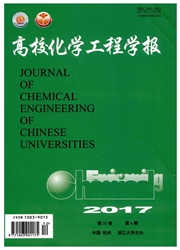

 中文摘要:
中文摘要:
为了提高碱催化酯交换工艺中粗生物柴油的精制效果,研究提出了膨润土吸附精制粗生物柴油的优化工艺。实验考察了膨润土用量、吸附温度和吸附时间对游离甘油和总甘油脱除效果的影响,测定了膨润土吸附游离甘油、单甘酯及二甘酯过程的动力学,并探讨了吸附精制过程的机理。结果表明,在膨润土用量为粗生物柴油质量的4%、吸附温度为60℃、吸附时间为40min条件下,精制得到的生物柴油质量达到欧洲标准(EN14214)要求,收率达到97.6%,效果明显优于传统的水洗精制法;膨润土吸附游离甘油、单甘酯及二甘酯过程动力学均符合拟二级动力学方程,其吸附活化能分别为27.1、28.2和31.8kJ·mol^-1,为物理吸附:膨润土的吸附动力是其亲水性,亲水性强及分子小的游离甘油和皂先吸附,而亲水性较弱、分子较大的单甘酯及二甘酯后吸附,吸附剂分两批加入对精制过程有利。
 英文摘要:
英文摘要:
In order to improve crude biodiesel purification efficiency in alkali-catalyzed transesterification, an adsorption process using bentonite was proposed. The influence of adsorbent dosage, adsorption temperature and time on the removal of free glycerin and total glycerin was investigated, and the kinetics of glycerin, monoglycerides and diglycerides adsorption were studied. Furthermore, the mechanism of the purification process was revealed and discussed. The results show that when 4 %(wt) oil mass of bentonite is used and the reaction is performed under 60~C for 40 min, the biodiesel yield can reach to 97.6%, which could fulfill the purity requirements of the European Standard for biodiesel fuel (EN 14214). The purification efficiency is much better than that of water washing purification. The adsorption of glycerin, monoglycerides and diglycerides on bentonite could all be well fitted with the pseudo-second-order kinetic model. The activation energies of the three adsorption processes are 27.1, 28.2 and 31.8 kJ·mol^-1, respectively, which indicates that these processes are physical adsorption. Hydrophilicity was proved to be the driving force for the bentonite adsorption processes The free glycerin and soap having high hydrophilicity and small molecular can be easily adsorbed at first, while monoglycerides and diglycerides with low hydrophilicity and large molecular are adsorbed later. The purification efficiency can be further improved by using two steps purification which means that the adsorbent is added separately for two times.
 同期刊论文项目
同期刊论文项目
 同项目期刊论文
同项目期刊论文
 期刊信息
期刊信息
